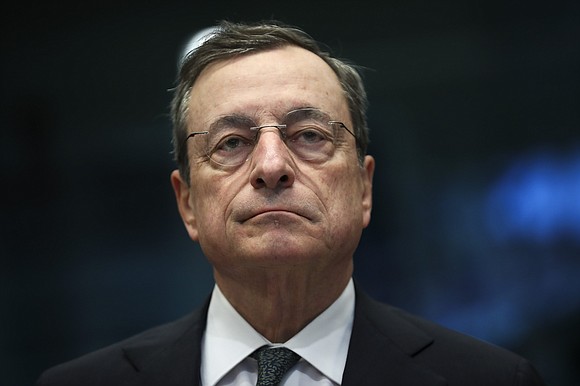Mario Draghi saved the euro. His replacement also faces a daunting task
CNN/Stylemagazine.com Newswire | 6/6/2019, 8:55 a.m.

By Julia Horowitz, CNN Business
(CNN) -- Mario Draghi is coming to the end of his run as president of the European Central Bank. His successor will face big problems with few obvious solutions.
The Italian central banker, whose eight-year term ends in October, is credited with saving the euro during Europe's sovereign debt crisis and guiding a subsequent recovery in the region's economy.
Even so, his successor is set to inherit a difficult set of circumstances, with little ammunition left in the battle against low growth and inflation.
As president, Draghi didn't raise interest rates once. The bank on Thursday pushed back the horizon for a potential rate hike even further, from the end of 2019 to the middle of next year at the earliest.
That leaves little room to maneuver if another crisis hits. Meanwhile, the outlook for the economy is darkening again.
The next central bank president won't be able to tackle that problem by acting alone, according to analysts. Instead, governments need to boost growth by spending more.
"The idea that the ECB can cure the eurozone's economic malaise, or even its lack of inflation, with a few tweaks here and there to monetary policy, seems far-fetched," said Société Générale strategist Kit Juckes.
"The eurozone is desperately in need of coordinated fiscal easing," he added.
Limited options
Who next leads the ECB is likely to hinge on jockeying between EU powers over the next president of the European Commission, the executive branch of the European Union.
If a French candidate is chosen as head of the Commission, for example, Germany is more likely to push Bundesbank President Jens Weidmann for the top ECB job.
The process, which analysts have compared to horse trading or a game of musical chairs, will play out over the coming weeks.
Even more complicated for the bank is what comes next in terms of policy. The victor enters into a tricky economic environment with limited tools at their disposal.
Interest rates are already negative and at record low levels. Europe only ended its huge bond-buying program in December.
"Whoever takes over in November, a daunting task awaits," Anatoli Annenkov, senior European economist at Société Générale, said in a recent note to clients.
There are no immediate fires for the ECB to fight. But concerns about global economic growth are on the rise, especially as trade tensions increase. This week, the World Bank cut its global growth forecast for 2019 to 2.6% from 2.9% in January.
Christine Lagarde, head of the International Monetary Fund, said Wednesday that trade fights between the United States, China and Mexico are "self-inflicted wounds" that are preventing a rebound in growth.
The incoming ECB president won't have much leeway to respond should conditions deteriorate further.
"Short-term, it doesn't matter who the person is," said Ángel Talavera, lead eurozone economist at Oxford Economics. "They won't be able to deviate much from current policy."
Stubborn inflation
One big reason for that is inflation, which is stuck well below the bank's target of close to 2%. That increases pressure on the ECB to continue trying to stimulate the economy.
"That's where even Draghi has failed after all these years," Annenkov told CNN Business. "At some point, that's going to hit credibility."
Inflation in the eurozone dropped last month, driving the point home. Headline inflation dipped to 1.2% in May from 1.7% the previous month.
It may be time for the new president to consider how the bank targets inflation and whether it's time for a different approach, Annenkov said.
But breaking from the orthodoxy won't be easy.
Adam Posen, president of the Peterson Institute for International Economics, joked at an ECB event last month that he wouldn't be invited to future gatherings because he thinks the 2% inflation target has "outlived its usefulness."
Channeling Draghi
Conversations around the leadership race have largely centered on the impact of hiring Weidmann. He's a hawk, meaning he favors tighter monetary policy with an emphasis on controlling inflation.
But analysts are playing down the impact his appointment would have on policy.
"The majority [of the ECB Governing Council] is still relatively dovish," Annenkov said. "A hawkish president cannot change those dynamics overnight."
There's also an argument to be made that installing a German as head of the ECB would be wise considering restraints on monetary action, according to Jacob Funk Kirkegaard, senior fellow at the Peterson Institute.
"By logic, fiscal policy will have to play a bigger role," he said.
Germany is best positioned within the European Union to enact a stimulus plan or tax cuts, the thinking goes. And Weidmann would be well situated to lobby German politicians on this front, Kirkegaard explained.
One big barrier for Weidmann will be his distance from Draghi's patient approach. He didn't stand by Draghi when he said he'd do "whatever it takes" to preserve the single currency — a 2012 intervention that helped end the euro crisis.
And he'd certainly be pushed on whether or not he'd be equally willing to intervene in government bond markets and serve as a buyer of last resort should the circumstances require, Annenkov said.
In the end, however, it's probably best to put to Draghi comparisons aside.
"It will be a tough act to follow Draghi," Annenkov said. "I think markets will just have to accept that."








